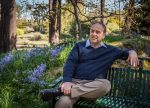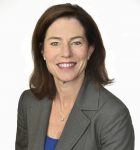B.C. Green party leader Andrew Weaver, MLA for Oak Bay-Gordon Head. (photo from Andrew Weaver)
Andrew Weaver calls the two-party system that typifies B.C. politics a “dichotomy of dysfunction.” As leader of the provincial Green party, he hopes to hold the balance of power in the next legislature so that his party can “hold to account either the B.C. Liberals or the B.C. NDP.”
“That would be a very, very wonderful situation,” Weaver told the Independent. While he is ostensibly running to be premier of the province, the scientist and MLA for Oak Bay-Gordon Head acknowledged he would be satisfied with a lesser role. Some opinion polls have suggested that Weaver, the first and only Green elected to the B.C. legislature, may be joined by other Green colleagues after the May 9 election. If the race between the Liberals and the NDP remains close across the province, that could put the Green party in an enviable position in the next legislature.
“I’d be very pleased,” Weaver said of the potential to hold the balance of power in a minority government. “One of the reasons why that’s important for people to know is, frankly, people don’t trust the Liberals right now. I see that all around. But they also don’t trust the B.C. NDP. Our role, if we should if we form the balance of power, is to actually hold to account either the B.C. Liberals or the B.C. NDP because they can trust us. The others can’t be trusted but we are convinced that people could get behind us and trust us to actually ensure that the others, if we were in a balance of power, actually follow through with what they say they would do.”
While touting his party’s comprehensive platform, which he urges Jewish Independent readers to review online, he also emphasized the quality of candidates the party has recruited.
“They’re not career politicians, they are stepping aside from their careers because, honestly, they can’t stand by and watch what’s going on anymore, this dichotomy of dysfunction,” he said.
Weaver, who was elected MLA in 2013 and became party leader in 2015, was the Canada Research Chair in climate modeling and analysis in the School of Earth and Ocean Sciences at the University of Victoria. He has been at UVic for 25 years and has degrees from UVic and Cambridge University and a PhD in applied mathematics from the University of British Columbia.
On issues of community security and culturally appropriate delivery of services, Weaver insisted that, before committing to any actions affecting ethnocultural groups, his party would consult with the communities in question.
“The first thing you would do is consult with those ethnocultural groups to ensure that what you think is the best approach is also what they think the best approach is,” he said. “I think that, in government, we do not have all the solutions.”
On threats and violence against minority groups, such as the desecration of the Jewish cemetery in his hometown of Victoria, Weaver said leaders have a role in shaping public opinion by “expressing clear and unequivocal disdain for hatred – hatred in all forms. There is nothing positive that can ever come of it.”
Supporting cultural events and other avenues where communities can learn about one another is critical to society’s cohesion, he said.
“Celebrating our diversity is one of the strongest things that can happen,” said Weaver, noting that his wife, who is Greek, grew up when Greeks were discriminated against in Canada and his mother, who is Ukrainian, faced discrimination growing up in Montreal.
“Celebrating our diversity is critical to embracing diversity,” he said. We have cultural festivals in Victoria and Vancouver – these need to be supported and celebrated because you break down barriers when people meet each other. When people get together and they talk … they share more commonalities than they do actual things that they disagree on. What’s important is the celebration of our multicultural values, ensuring that there are funds available, ensuring that there are places available that will bring cultures together, rather than apart.”
Education is another key to multicultural success, Weaver added.
“We’ve gone through extensive reevaluation of the curriculum to ensure that indigenous values and rights and culture is covered appropriately in our K-to-12 system, but that should be true of all multicultural values,” he said. “When a child is born, they don’t even understand what prejudice is. Prejudice is a learned concept, it’s not something that a child understands. So, if one is able to develop an educational system that promotes tolerance, promotes respect for diversity, promotes multicultural values, promotes religious tolerance, you’re not dealing with any perceived kinds of barriers to inclusion early on. [The Green party has] a major investment that we propose in the K-to-12 system and one of the things we’re hoping to do is ensure that teachers can deliver the new curriculum, which does have more multicultural values expressed in it, and to ensure that barriers early on are not put up.”
Involving cultural communities in the delivery of social services is good for the communities and the government, Weaver added.
“You are going to get a lot further partnering, for example, with the Jewish community to provide social support for those who share the Jewish values, culture, religion, than you would trying to impose a one-size-fits-all model,” he said.
This extends to Green support for independent schools.
“Continued funding for the independent system is critical because there are people who determine that their children are best served by an education system that provides the curriculum – because that’s provincially mandated – but does so in a manner that shares the values and cultures that the child is being educated in. So, for example, a Jewish school, we would support the independent funding to continue there, same with a Sikh school, same with a Christian school. It’s important though that the province maintain control of the curriculum to ensure that it’s consistently taught across society.”
Weaver has been an outspoken opponent of the anti-Israel boycott, divestment and sanctions movement.
“Solutions to complex issues come through dialogue and bringing people together, not dividing and picking winners or losers,” he said.
Last year, the federal Green party passed a resolution endorsing BDS. Weaver condemned it forcefully and publicly.
“It’s just not my style,” he said. “It’s not the B.C. Greens’ style to be divisive and hurtful. We are here to be inclusive and bring people together…. You’re there to actually broker solutions and that’s what troubled me so much about the federal Green party. What had happened there, clearly, was they had had a large sign-up of members going into the convention and it was just outrageous that this policy – I’m not a member of the federal Green party, just so you know – but it was outrageous that this would end up on the floor for discussion.… It’s not something that would have made it to the floor of the B.C. Greens, it would never have got past our policy committee.”
He is particularly passionate on this matter in part because of the experience of his mother’s family in Ukraine.
“They were kulaks,” he said, referring to a category of independent peasant farmers who were declared “class enemies” under Stalinism. The family’s farm was collectivized, Weaver’s grandfather was sent to Siberia and his mother and grandmother were interned in a camp.
Another experience that impacted him was meeting a survivor of the Holocaust who came to see him when a billboard in the Victoria area, paid for by a group called Friends of Cuba, called for a boycott of Israel.
“She was devastated,” Weaver recalled of the meeting. “People who live these horrific stories and bring them home, when you hear them, you can only imagine what they’ve gone through. And when you see people really taking positions that I don’t think are fully informed, comments that are divisive positions … they don’t understand the hurt that they are doing. By putting that up, they don’t understand that they are hurting people.… It is tone deaf.
“Everybody recognizes that the situation in the Middle East is one where there is a lot of tension. But we also have to recognize that there is one stable democracy in the Middle East and we have to work with that democracy and ensure that the values that we instil within our society are consistent with the embrace of inclusive values that we expect others to follow.… We need to be very careful about how we approach the situation. It’s very volatile and we need to understand it better before we just start blindly picking winners and losers.”
The Independent invited the leaders of the B.C. Liberals, the New Democratic Party and the Greens to be interviewed for our election coverage. The Liberal campaign did not make their leader available. An interview with NDP leader John Horgan appeared in the March 31 issue and is available at jewishindependent.ca.








